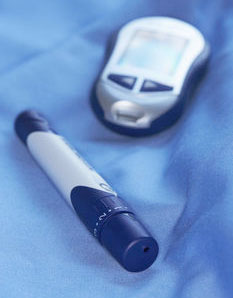|
Nearly 250 million people across the globe are affected by diabetes, and that number is growing by 7 million per year. As diabetes becomes more commonplace, it’s important to be aware of the health complications involved. While it’s well-known that diabetes is linked with heart disease, stroke and other ailments, many people don’t understand that oral health is compromised in people with uncontrolled diabetes. Following are some FAQs to help acquaint you with the issues:
What types of oral health problems are common in people with diabetes?
Uncontrolled diabetes results in a higher risk for tooth decay, taste impairment, gum disease, fungal infections such as thrush, dry mouth (a condition of reduced saliva), and slow or poor recovery of gum tissues after dental procedures. Smoking exacerbates these risks; please talk to us if you are having trouble quitting – we can offer resources to help you.
If my diabetes is well controlled, am I still at risk?
Those whose diabetes is well controlled are at the same risk level as people who don’t have diabetes. Thus taking control of your diabetes is a key factor in maintaining good oral health.
What do I need to let your office know about my diabetes?
As with any overall health concern, let us know about the situation so we may take it into consideration as we plan your dental care. If you've been diagnosed with diabetes, let us know. We need to be aware of how you are controlling the disease, what medications you are taking, and the contact information for your diabetes doctor. Depending on the state of your oral health and what treatments we are planning, we may need more detailed information about your diabetes.
What do I need to let my diabetes doctor know about my oral health?
If you have any type of dental treatment planned, talk to your diabetes doctor about it. In some cases, your doctor may instruct you to delay any non-emergency dental work until your diabetes is better controlled. If you need oral surgery, check with your doctor about the need for medications or adjusting your eating and insulin schedule.
Does diabetes affect the occurrence and severity of gum disease?
Diabetes increases the risk of infection throughout the body. Periodontal disease – more commonly known as gum disease – is an infection of the gums and bones that anchor your teeth. People whose glucose levels are poorly controlled are at a higher risk for gum disease than those whose levels are well controlled. They also experience more severe cases of gum disease, because the healing process happens more slowly due to the diabetes.
 Can gum disease affect blood sugar levels? Can gum disease affect blood sugar levels?
Recent research points to a two-way relationship between diabetes and gum disease. In other words, while diabetes increases the risk of gum disease, gum disease may affect the ability to control blood sugar levels and thus advance the development of diabetes. Also, gum disease can result in loose or missing teeth, which makes it difficult to maintain a balanced diet.
What are the signs of gum disease?
Watch for red, sore, swollen or bleeding gums, loose teeth or dentures, sensitive teeth or gums, bad breath, and receding gums. It’s possible to have gum disease without all the symptoms, so if you suspect there may be a problem, call us immediately.
What can I do to ensure healthy teeth and gums?
Be sure to control your blood glucose levels and maintain a balanced diet. Brush at least twice a day and floss once a day. If you are a smoker, quit the habit. (We can help you with this.) If you wear dentures, remove and clean them every day. And be sure to have a professional cleaning and check-up twice a year. Depending on the state of your oral health and any treatments you may need, we may suggest more frequent visits.
|

 Can gum disease affect blood sugar levels?
Can gum disease affect blood sugar levels?